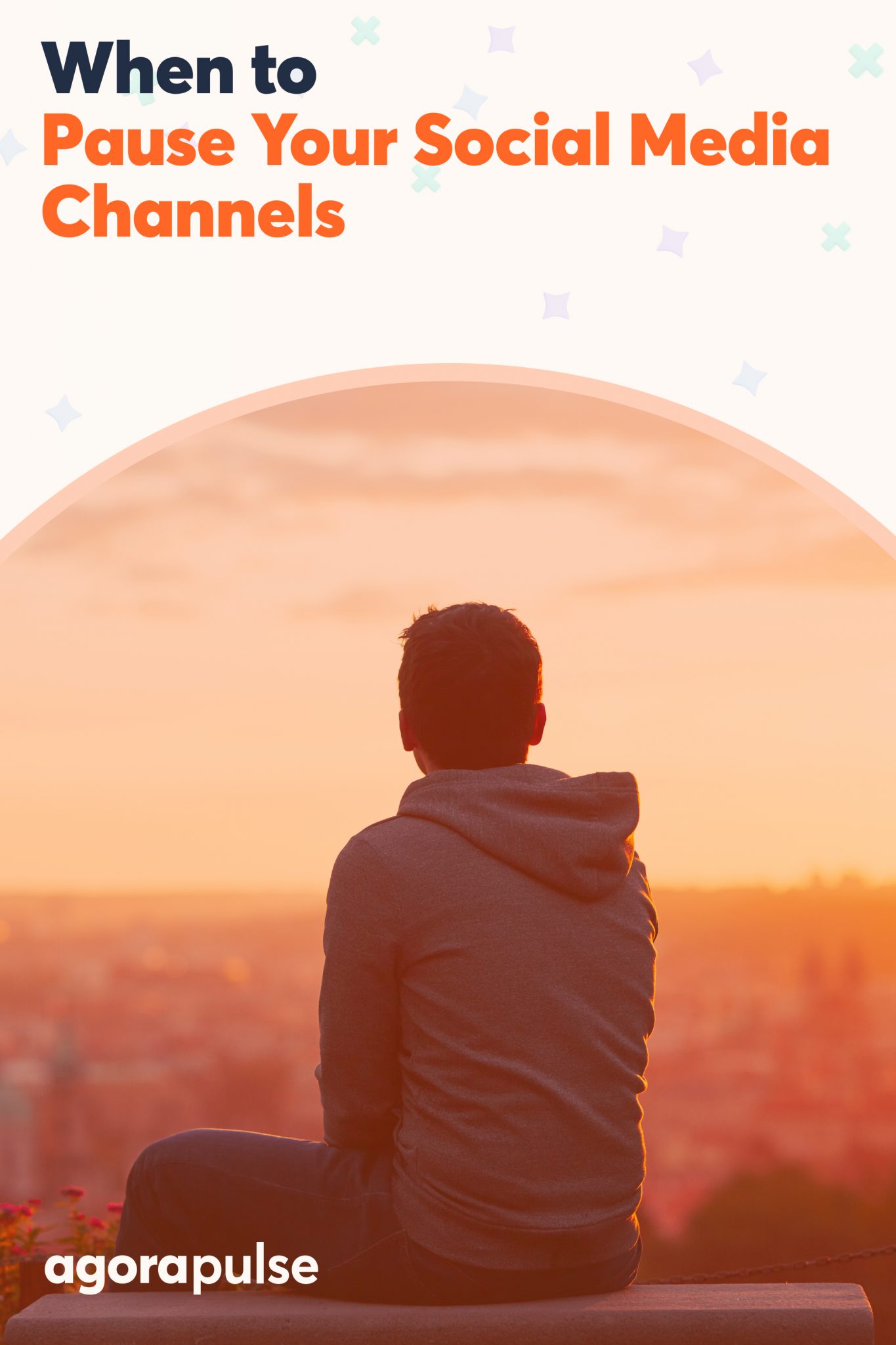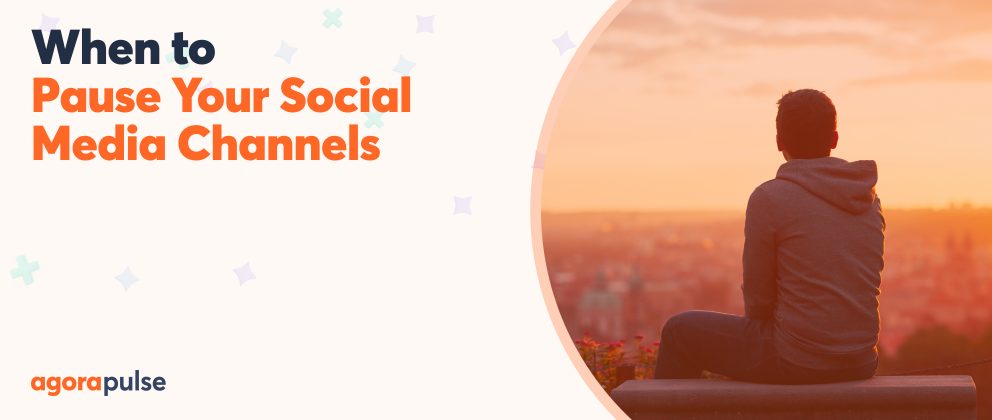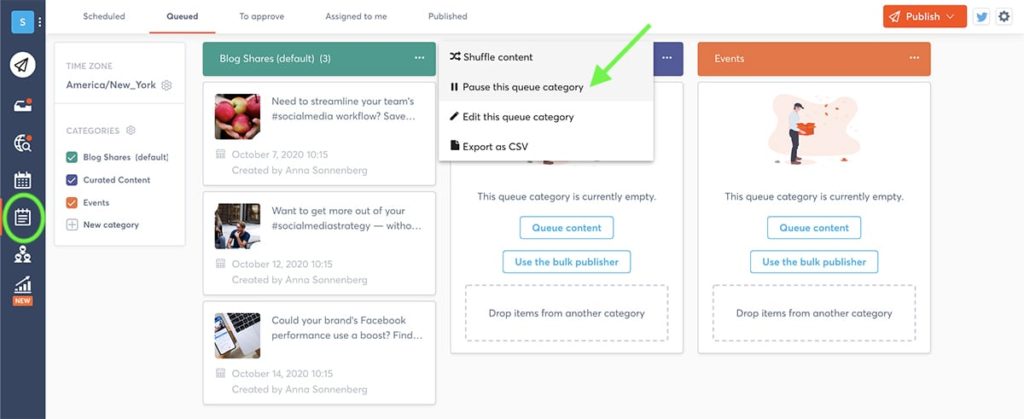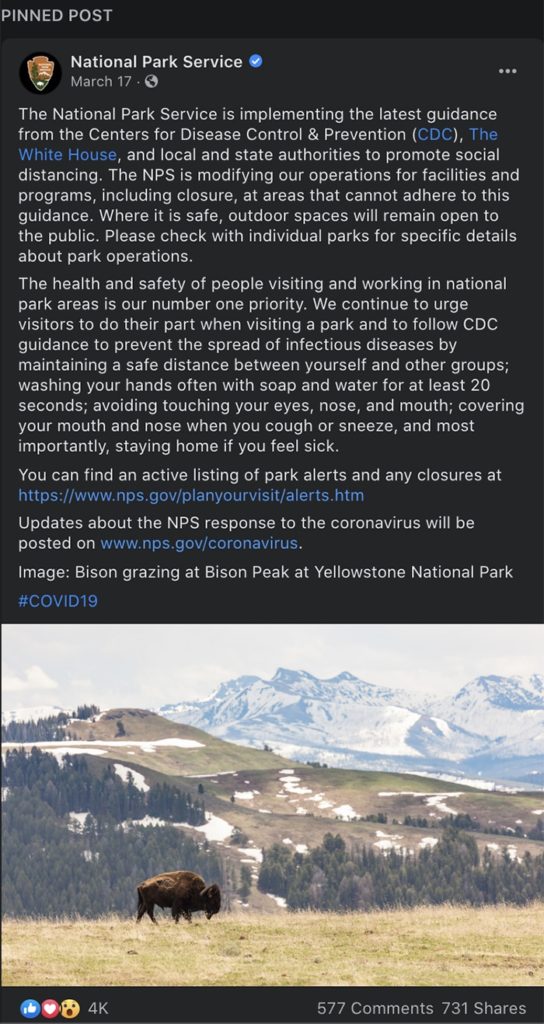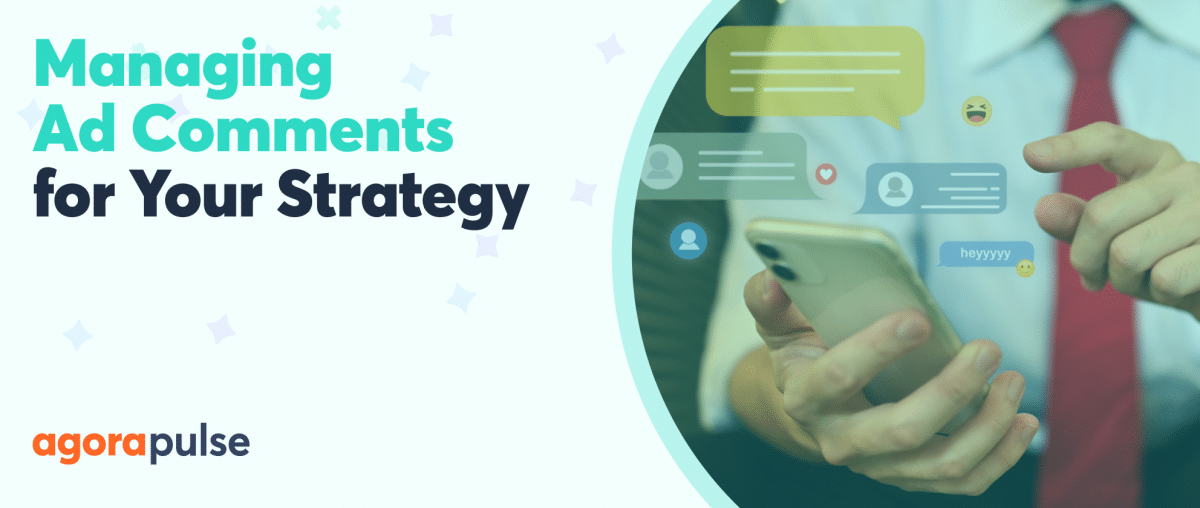Wonder when and if there’s a good time to pause your social media channels? Let’s dig into reasons for and against pausing your social media channels.
Many marketers may be struggling to figure out whether they should pause social media channels for their company or clients in light of different world events, natural disasters, and other situations.
Let’s look at when you should put your social media channels on hold and review how to make the decision process as smooth as possible.
6 Questions to Consider Regarding a Social Media Pause
To help you decide whether to do a social media pause, consider the event or situation itself. Before you decide whether it’s a major or minor event, you’ll have to look further into it. After all, even then, minor issues can turn into major crises quickly, especially on social media.
To make the smartest decision, ask yourself or your team a few simple questions.
Is the situation likely to escalate? Or has the event already happened?
A minor issue already fizzling out might warrant a brief pause for a few hours or the rest of the day.
However, a major world event could mean a multi-day hold or reworking your social media schedule for the foreseeable future.
Does the situation directly affect our brand or our customer base?
When an issue is relevant to your brand, your mission, or your local area, it’s much more important to acknowledge the situation and respond thoughtfully.
Has our brand taken a stance or planned a response to the situation or event?
If your company is raising funds, offering support to people involved, or otherwise taking a stance, it’s critical to be transparent about your contributions.
Will our brand look out of touch if we don’t acknowledge the issue?
When everyone else is talking about an important issue but your brand declines to get involved, you may risk raising eyebrows.
How are our peers responding to the situation or event?
Other brands in your industry or area may be just as unsure as you are. Yet checking to see how they’re approaching the situation can help you gauge its importance and guide your response.
What kind of social media content do we have scheduled?
If you’re in the midst of a major social media campaign, you may have to rethink your calendar. This may take extra time and resources, but it could make a big impact.
Questions to Ask Your Agency Clients
If your agency manages social media for clients, you’ll need to advise them about best practices.
To give them the most helpful guidance, get their input about a social media pause first.
Ask your point of contact questions like:
How has the event affected your brand or audience?
Your clients may have additional data points that can inform your insights and assist in developing a more nuanced response.
Do you expect service interruptions or delays?
The more specifics you have, the more accurately you can respond to DMs and rework scheduled posts.
Do you want to make a statement on your social channels?
No matter how well you know your clients, asking about their preferences is always a good idea. You might be surprised to learn that they’ve already prepared a response or made relevant changes that they’re eager to share.
When Pausing Social Media Content Makes Sense
After discussing the situation with your colleagues or clients, it’s time to make a decision.
It typically makes sense to pause your social media content when:
You want to avoid a PR problem
If your company is directly involved in the situation, avoid publishing any social media posts that could mislead followers or lead to a PR crisis.
For example, if you work for a health care provider and pandemic-related news breaks, it’s probably best to put your channels on hold and wait for official guidance from your local public health agency.
You don’t want to appear tone-deaf
If your brand is unaffected but the world around you is feeling the effects, avoid sounding out of touch.
For example, if your brand’s page has a high percentage of followers from an area that’s in the path of a natural disaster, it’s generally best to put everything on hold for a day or two.
Tweeting about your big sale while your followers make life-or-death decisions can make your brand look self-centered or detached from reality.
When to Avoid Pausing Your Social Media Publishing
Putting your regularly scheduled social media content on hold can help your brand avoid major missteps. Yet in some cases, it’s a better idea to keep publishing consistently instead.
Is your brand is directly involved in the situation or could it provide helpful advice via social channels? Then it may benefit your brand and your followers not to pause.
In fact, you might even consider increasing your posting frequency to share news, resources, and support.
For example, when wildfire news broke, the Oregon Department of Forestry began to post multiple times a day, sharing warnings, updates, and tips for seeking disaster-related support.
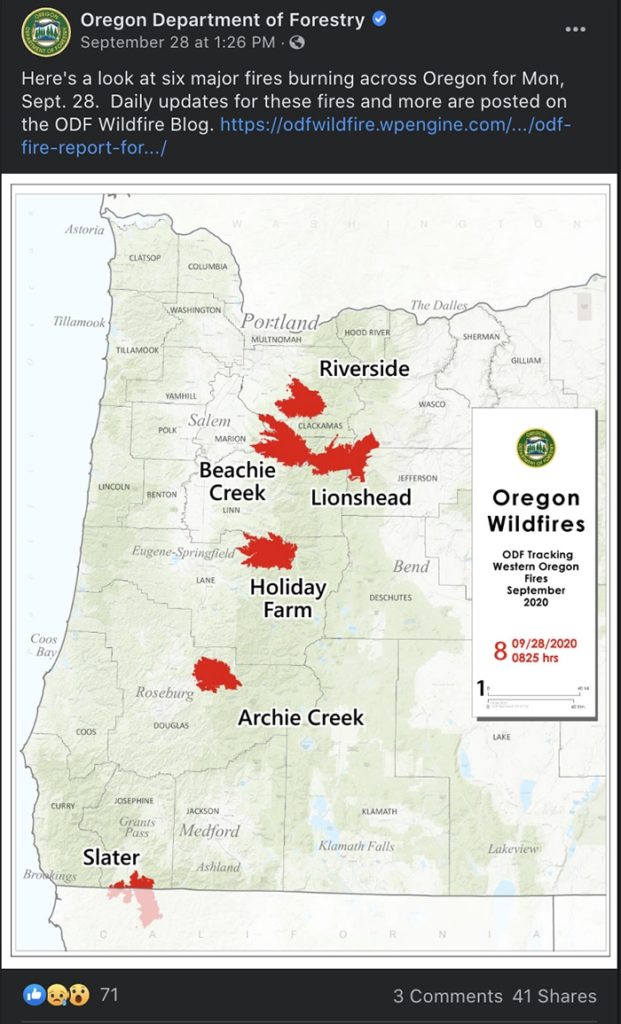
Example of social media content during a natural disaster
When Toning Down Your Message Makes Sense
In many cases, it’s clear that your brand should either put everything on pause or lend a voice to the cause. But what happens when neither option seems quite right?
Perhaps the situation isn’t relevant to your brand’s mission, but you know it’s causing hardships for others.
Maybe the situation seems like it will continue indefinitely, but you can’t hold off on publishing social media content for months on end.
Instead, consider toning down your message.
Your brand doesn’t have to share an opinion about the big news or jump into the fray.
Yet you can avoid the hard sell, take a lighter tone, or redirect followers.
By adjusting your tactics, you can demonstrate that your brand is sensitive to the massive impact or the lack of normalcy.
For example, the San Francisco Travel Association shared locally inspired Zoom backgrounds when the pandemic made tourism impossible.
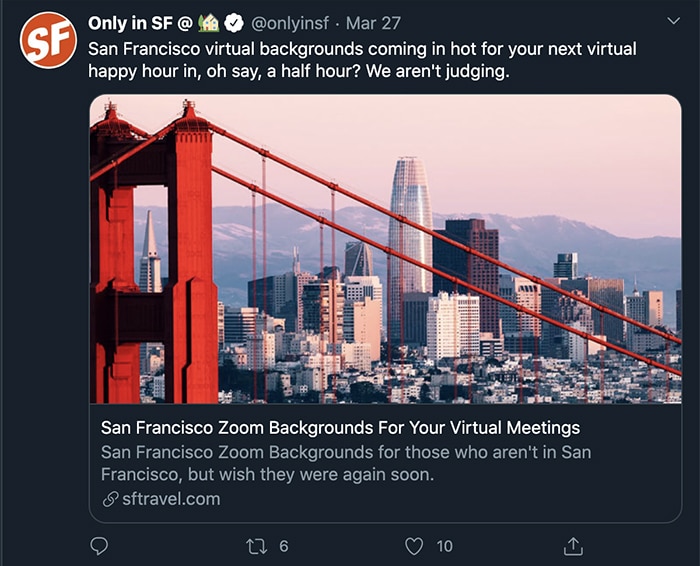
Example of social media content in a pandemic
Checklist Before You Pause Social Media Publishing
If you’ve decided to pause your social channels or revisit your scheduled content, go over the checklist below first.
By following these best practices, you can avoid mistakes and prepare to resume your social channels when the time is right.
Communicate with your team or clients
Don’t let your course of action surprise key stakeholders.
Tell all team members or points of contact what you plan to do, whether that’s putting all social channels on hold or revising content to acknowledge the ongoing situation.
Review your scheduled social media content
First, log in to your social media dashboard and pause any relevant publishing queues.
Next, shift any scheduled items to a saved content queue and pause it. Then post any urgent updates and decide when to resume your queued content.
Remember to reread your content before rescheduling, as you may need to rework it based on the current context.
Use Agorapulse to help pause your social media content when you need and restart when you are ready.
Pause automated social media content
If you use content curation tools like Quuu or apps like IFTTT, check or pause them.
Make sure they won’t automatically share new links or RSS feeds until you’ve resumed your normal publishing schedule.
Consider your social ads
It’s easy to focus your efforts on organic content and keep your social ads running. But paid content can sound just as out of touch as organic content can.
Review your ad campaigns and consider pausing them until you resume your regular calendar.
Check your editorial calendar
Some of your most important campaigns might not be live yet, but that doesn’t mean you should run them as planned.
Be proactive about rescheduling big campaigns or seasonal events. Consider whether launching them sooner would make your brand look tone-deaf or prevent you from reaching your goals.
Published a new pinned post
Don’t leave your followers with complete radio silence.
Instead, let your audience know what to expect from your brand in the coming days or weeks. Pin your post to the top of your Facebook or Twitter feed to make your message as easy as possible to find.
Example of a pinned post during a natural disaster
Point followers to your website
If you suspect your followers will have questions about your response or any aspect of your business, help them get answers quickly. Link to FAQs or a contact page in your pinned post or bio.
Monitor engagement and set up social listening
Pausing scheduled content doesn’t mean taking a break from social media.
While everything is on hold, monitor your social inbox closely so you can respond efficiently.
Add relevant keywords and hashtags to your social listening dashboard so you can follow the conversation as it evolves.
In Conclusion
Pausing your social media channels can be a tough decision. Yet it’s even harder to make a smart choice when you approach the issue haphazardly.
With these questions and checklist steps at your fingertips, you can keep your social media channels running smoothly, even when the unexpected happens.
Get started on saving time and energy on your own social media management! Check out our free trial of Agorapulse to help you schedule, track, and measure all your social media efforts.
